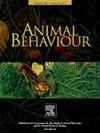Adult males are less social than juveniles and adult females in a wild agamid species
IF 2.3
2区 生物学
Q2 BEHAVIORAL SCIENCES
引用次数: 0
Abstract
Across their lifetime, individuals experience differing social environments and may adjust their social behaviour accordingly, leading to age-dependent social behaviour. Studying the ontogeny of social behaviour is of great importance, as it can provide valuable insights into the development and maintenance of sociality. So far, most studies investigating age-dependent social behaviour have focused on animal species exhibiting parental care (e.g. primates, cetaceans). However, in species lacking parental care, juveniles' behaviour likely has a greater impact on their survival than in species with parental care, owing to the lack of parental feeding and protection. Here, we explored whether affiliative behaviour differed between juvenile and adult eastern water dragons, Intellagama lesueurii, a species with no parental care. Specifically, we investigated the effect of age on individuals’ social associations and social environment (i.e. number of available social partners). We found that adult males were less gregarious, found in smaller groups and had fewer associates than both juveniles and adult females. Additionally, adult males fostered weaker associations than juveniles. Most importantly, this phenomenon was observed despite adult males experiencing similar opportunities to socialize as adult females and juveniles on the observation scale, while having more opportunities than juveniles on the yearly scale. Our findings may be driven by an adaptive avoidance of adult males by juveniles and adult females.
在一种野生姬蛙物种中,成年雄蛙的社会性低于幼蛙和成年雌蛙
在人的一生中,个体会经历不同的社会环境,并相应地调整自己的社会行为,从而形成与年龄相关的社会行为。研究社会行为的本体发育非常重要,因为它可以为社会性的发展和维持提供宝贵的见解。迄今为止,大多数调查年龄依赖性社会行为的研究都集中在有父母照顾的动物物种(如灵长类、鲸类)。然而,在缺乏亲代照料的物种中,由于缺乏亲代的喂养和保护,幼年行为对其生存的影响可能比有亲代照料的物种更大。在这里,我们探讨了东部水龙(Intellagama lesueurii)幼体和成体的从属行为是否存在差异。具体来说,我们研究了年龄对个体的社会联系和社会环境(即可用的社会伙伴数量)的影响。我们发现,与幼年和成年雌性相比,成年雄性的群居性较弱,发现的群体较小,伙伴数量也较少。此外,成年雄性比幼年雄性的结社能力更弱。最重要的是,尽管在观察尺度上,成年雄性与成年雌性和幼年雄性的社交机会相似,但在年度尺度上,成年雄性比幼年雄性有更多的社交机会,这种现象还是被观察到了。我们的发现可能是由于幼鸟和成年雌鸟对成年雄鸟的适应性回避。
本文章由计算机程序翻译,如有差异,请以英文原文为准。
求助全文
约1分钟内获得全文
求助全文
来源期刊

Animal Behaviour
生物-动物学
CiteScore
4.60
自引率
8.00%
发文量
236
审稿时长
10.2 weeks
期刊介绍:
Growing interest in behavioural biology and the international reputation of Animal Behaviour prompted an expansion to monthly publication in 1989. Animal Behaviour continues to be the journal of choice for biologists, ethologists, psychologists, physiologists, and veterinarians with an interest in the subject.
 求助内容:
求助内容: 应助结果提醒方式:
应助结果提醒方式:


